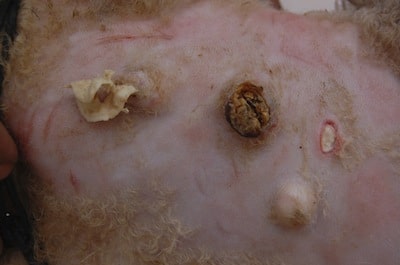This sheep has caseous lymphadenitis (CL) – a chronic, contagious disease caused by Corynebacterium pseudotuberculosis, which is a gram-positive, intracellular, facultative bacteria.
When endemic, it causes huge economic losses for small ruminant producers in the United States due to death, carcass condemnation, loss of hide or wool, and premature culling.
CL is characterized by abscesses in or near external lymph nodes (external form) or within organs or internal lymph nodes (internal form).
Click here to see EXternal CL in the parotid lymph node, submandibular lymph node and the prefemoral lymph node.
Click here to see INternal CL in the liver and in the mesenteric lymph nodes of a sheep.
Definitive Dx requires bacterial culture of external abscesses or serology for internal abscesses (variably helpful).
It is hard to eliminate CL from endemic flocks due to its highly contagious nature, its ability to live in the soil, and silent carriers. Recommendations include culling affected animals, strict biosecurity, and vaccination protocols.
Treatment of affected animals with antibiotics and abscess care can be done in certain circumstances.
Ref: Pugh and Baird’s Sheep and Goat Medicine 2nd ed. pp. 142-3, 268-70. Image courtesy of Lucyin.

